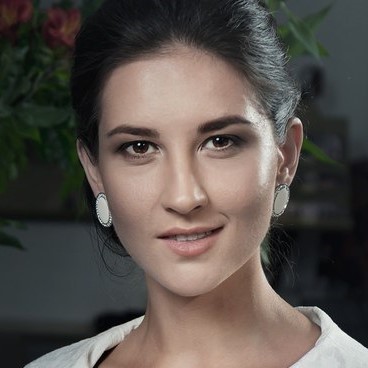Scientific interestsContractor in projects/programs
1. AP05132138 “Development of technology for the production of integrated self-sustaining urban air purification and conditioning systems.”
2. AP14870281 “Development of new approaches to digital image processing using convolutional neural networks.”
3. AP14870416 “Development of new approaches to solving philosophical problems of multi-valued logic as a means of establishing patterns of thinking.”
4. BR24992908 “Support system for agrotechnical measures in crop production based on a set of monitoring tools and artificial intelligence methods (Agroscope).”
5. AP26104635 “Development of new information technologies based on the formalization of dialectical logic.”
6. BR28713375 “Multipurpose robotic unmanned aerial platform for remote monitoring (AeroScope).”
7. Head of the “Zhas Galym” project for 2022-2024:
AP15473224 “Development of new approaches to constructing a theory of scientific revolutions.”
Publications[1] Y. Vitulyova, K. Kadyrzhan, A. Kadyrzhan, D. Shaltykova, and I.
Suleimenov, “Reducing the description of arbitrary wave field converters to tensor
form,” Int. J. Inf. Technol. Singapore, vol. 17, no. 6, pp. 3275–3284, 2025.
[2] Kadyrzhan, D. Matrassulova, Y. Vitulyova, and I. Suleimenov, “Discrete
Cartesian coordinate transformations: Using algebraic extension methods,” Appl. Sci.
Switzerland, vol. 15, no. 3, p. 1464, 2025.
[3] Bakirov, D. Matrassulova, Y. Vitulyova, D. Shaltykova, and I. Suleimenov,
“The specifics of the Galois field GF(257) and its use for digital signal processing,” Sci.
Rep., vol. 14, no. 1, p. 15376, 2024.
[4] Suleimenov, O. Gabrielyan, E. Kopishev, A. Bakirov, and Y. Vitulyova,
“Advanced applications of polymer hydrogels in electronics and signal processing,”
Gels, vol. 10, no. 11, p. 715, 2024.
[5] Y. Vitulyova, O. Gabrielyan, A. Bakirov, and I. Suleimenov, “Humanist
ideals in an era of increasing confrontation: The need to renew basic paradigms,” J.
Ecohumanism, vol. 3, no. 7, pp. 2064–2076, 2024.
[6] K. Kadyrzhan, D. Kaldybekov, S. Baipakbaeva, D. Matrassulova, and I.
Suleimenov, “Electronic Fourier–Galois spectrum analyzer for the field GF(31),” Appl.
Sci. Switzerland, vol. 14, no. 17, p. 7770, 2024.
[7] D. Matrassulova, A. Massalimova, A. Bakirov, Y. Vitulyova, and I.
Suleimenov, “LGBT agenda in Kazakhstan: Social and psychological aspect,” J.
Ecohumanism, vol. 3, no. 6, pp. 1799–1814, 2024.
[8] S. Ibragim, K. Mariya, and Y. Vitulyova, “Projective psychological tests
from the point of view of neural network theory of society,” J. Ecohumanism, vol. 3, no.
4, pp. 2603–2609, 2024.
[9] S. Ibragim, G. Oleg, and Y. Vitulyova, “Problems of many-valued logic
from the point of view of the theory of socio-cultural code,” J. Ecohumanism, vol. 3, no.
4, pp. 236–248, 2024.
[10] Suleimenov, A. Kadyrzhan, D. Matrassulova, and Y. Vitulyova,
“Peculiarities of applying partial convolutions to the computation of reduced numerical
convolutions,” Appl. Sci. Switzerland, vol. 14, no. 14, p. 6388, 2024.
[11] Y. Vitulyova, I. Moldakhan, P. Grigoriev, and I. Suleimenov, “Some
regularities of transaction statistics of cryptocurrency Ethereum: Opportunities to study
the impact of space weather on human economic behavior on a global scale,” Front.
Blockchain, vol. 7, p. 1455451, 2024. [12] I.E. Suleimenov, O.A. Gabrielyan, A.R. Massalimova, and Y.S. Vitulyova,
“World spirit from the standpoint of modern information theory,” Eur. J. Sci. Theol., vol.
20, no. 1, pp. 19–31, 2024.
[13] Y. Vitulyova, K. Kadyrzhan, A. Kadyrzhan, and I. Suleimenov,
“Application of focusing systems to the protection of information during data
transmission in the zone of direct radio visibility,” Int. J. Electron. Telecommun., vol.
70, no. 3, pp. 699–705, 2024.
[14] Suleimenov, M. Kostsova, A. Grishina, D. Matrassulova, and Y. Vitulyova,
“Empirical validation of the use of projective techniques in psychological testing using
Galois fields,” Front. Appl. Math. Stat., vol. 10, p. 1455500, 2024.
[15] Y. Vitulyova, D. Matrassulova, M. Kostsova, S. Kabdushev, and I.
Suleimenov, “The problem of generating psychological tests using artificial
intelligence,” in Proc. 5th Int. Conf. Mach. Learn. Human Comput. Interact. (MLHMI),
2024, pp. 42–47.
[16] Y. Vitulyova, A. Bakirov, D. Shaltykova, and I. Suleimenov, “Analysis of
the statistics of information processes in telecommunication networks from the point of
view of a neural-network model of the noosphere,” E3S Web Conf., vol. 460, p. 04003,
2023.
[17] I.E. Suleimenov, Y.S. Vitulyova, S.B. Kabdushev, and A.S. Bakirov,
“Improving the efficiency of using multivalued logic tools,” Sci. Rep., vol. 13, no. 1, p.
1108, 2023.
[18] I.E. Suleimenov, Y.S. Vitulyova, S.B. Kabdushev, and A.S. Bakirov,
“Improving the efficiency of using multivalued logic tools: Application of algebraic
rings,” Sci. Rep., vol. 13, no. 1, p. 22021, 2023.
[19] I.E. Suleimenov, Y.S. Vitulyova, and D.K. Matrassulova, “Features of
digital signal processing algorithms using Galois fields GF(2n+1),” PLoS One, vol. 18,
no. 10, Art. no. e0293294, Oct. 2023.
[20] Y.S. Vitulyova, I.E. Suleimenov, D.K. Matrassulova, and A.S. Bakirov,
“Discrete form of the Huygens–Fresnel principle: To the multi-dimensional analog of
the Nyquist–Shannon sampling theorem,” Int. J. Inf. Technol. Singapore, vol. 15, no. 7,
pp. 3751–3759, 2023.
[21] B.B. Ermukhambetova, G.A. Mun, S.B. Kabdushev, Y.S. Vitulyova, and
I.E. Suleimenov, “New approaches to the development of information security systems
for unmanned vehicles,” Indones. J. Electr. Eng. Comput. Sci., vol. 31, no. 2, pp. 810–
819, 2023.
[22] Bakirov, I. Suleimenov, and Y. Vitulyova, “To the question of the practical
implementation of ‘digital immortality’ technologies: New approaches to the creation of
AI,” in Lect. Notes Netw. Syst., vol. 559, pp. 368–377, 2023.
[23] D.K. Matrassulova, Y.S. Vitulyova, S.V. Konshin, and I.E. Suleimenov,
“Algebraic fields and rings as a digital signal processing tool,” Indones. J. Electr. Eng.
Comput. Sci., vol. 29, no. 1, pp. 206–216, 2023.
[24] S. Kabdushev, D. Shaltykova, Y. Vitulyova, A. Bakirov, and I. Suleimenov,
“Neural network technology for choosing a learning path,” in Proc. 15th Int. Conf.
Comput. Autom. Eng. (ICCAE), 2023, pp. 13–16.
[25] Y.S. Vitulyova, K.N. Kadyrzhan, S.B. Kabdushev, A.V. Grishina, and I.E.
Sileimenov, “Aromatherapeutic correction of psychoemotional state as a means of
promoting an ecological worldview,” in Lect. Notes Netw. Syst., vol. 574, pp. 1145–
1152, 2023.
[26] A.T. Saidakhmet, Y.S. Vitulyova, A.S. Bakirov, A.V. Grishina, and I.E.
Sileimenov, “Principles and technical means of implementing the methods of group
correction of the psychoemotional state in the online format,” in Lect. Notes Netw. Syst.,
vol. 574, pp. 1126–1136, 2023.
[27] Moldakhan, A.S. Bakirov, Y.S. Vitulyova, A.V. Grishina, and I.E.
Sileimenov, “Gamification of environmental monitoring: Technical and informational
means of supporting the formation of civil society institutions,” in Lect. Notes Netw.
Syst., vol. 574, pp. 1116–1125, 2023.
[28] I.E. Suleimenov, Y.S. Vitulyova, D.B. Shaltykova, D.K. Matrassulova, and
A.S. Bakirov, “Pattern recognition methods as a base of development of new instruments
for investigations in physical chemistry,” in ACM Int. Conf. Proc. Ser., 2022, pp. 127–
132.
[29] I.E. Suleimenov, A.S. Bakirov, and Y.S. Vitulyova, “Prospects for the use
of algebraic rings to describe the operation of convolutional neural networks,” in ACM
Int. Conf. Proc. Ser., 2022, pp. 1–7.
[30] I.E. Suleimenov, D.K. Matrassulova, I. Moldakhan, S.B. Kabdushev, and
A.S. Bakirov, “Distributed memory of neural networks and the problem of the
intelligence’s essence,” Bull. Electr. Eng. Inform., vol. 11, no. 1, pp. 510–520, 2022.
[31] O. Gabrielyan, E. Vitulyova, and I. Suleimenov, “Multi-valued logics as an
advanced basis for artificial intelligence (as an example of applied philosophy),”
Wisdom, vol. 21, no. 1, pp. 169–181, 2022.
[32] E.S. Vitulyova, D.K. Matrassulova, and I.E. Suleimenov, “Construction of
generalized Rademacher functions in terms of ternary logic: Solving the problem of
visibility of using Galois fields for digital signal processing,” Int. J. Electron.
Telecommun., vol. 68, no. 2, pp. 237–244, 2022.
[33] Suleimenov, Y. Vitulyova, and A. Bakirov, “Hybrid number systems:
Application for calculations in Galois fields,” in Proc. 3rd Asia Conf. Comput. Commun.
(ACCC), 2022, pp. 126–130.
[34] Y.S. Vitulyova, A.S. Bakirov, and I.E. Suleimenov, “Galois fields for digital
image and signal processing: Evidence for the importance of field specificity,” in Proc.
5th Int. Conf. Pattern Recognit. Artif. Intell. (PRAI), 2022, pp. 637–642.
[35] S. Kabdushev, K. Kadyrzhan, Y. Vitulyova, V. Yevstifeyev, and I.
Suleimenov, “Means of aromatherapy of mass use as a tool for correcting the
psychophysiological state of society,” in Proc. 2nd Int. Conf. Robot. Autom. Artif. Intell.
(RAAI), 2022, pp. 152–156.
[36] S. Kabdushev, K. Kadyrzhan, Y. Vitulyova, E. Kopishev, and I. Suleimenov,
“Floating focusing system based on polymer films: A new example of a smart energy
system,” in Proc. 2nd Int. Conf. Robot. Autom. Artif. Intell. (RAAI), 2022, pp. 182–187.
[37] A.S. Bakirov, Y.S. Vitulyova, A.A. Zotkin, and I.E. Suleimenov, “Internet
user’s behavior from the standpoint of the neural network theory of society: Prerequisites
for the meta-education concept formation,” ISPRS Arch., vol. 46, no. 4/W5-2021, pp.
83–90, 2021.
[38] E.S. Vitulyova, D.K. Matrassulova, and I.E. Suleimenov, “New application
of non-binary Galois fields Fourier transform: Digital analog of convolution theorem,”
Indones. J. Electr. Eng. Comput. Sci., vol. 23, no. 3, pp. 1718–1726, 2021.
[39] A.B. Seidaliyeva, G.B. Niyazova, E.E. Kopishev, A.S. Bakirov, and I.E.
Suleimenov, “Small green energy: Implementation through gamification of the
educational process,” in Proc. World Congr. New Technol., 2021.
[40] Y.S. Vitulyova, A.S. Bakirov, S.T. Baipakbayeva, and I.E. Suleimenov,
“Interpretation of the category of complex in terms of dialectical positivism,” IOP Conf.
Ser. Mater. Sci. Eng., vol. 946, no. 1, Art. no. 012004, 2020.
[41] Y.S. Vitulyova, A.S. Bakirov, D.B. Shaltykova, and I.E. Suleimenov,
“Prerequisites for the analysis of the neural networks functioning in terms of projective
geometry,” IOP Conf. Ser. Mater. Sci. Eng., vol. 946, no. 1, Art. no. 012001, 2020.
[42] I.E. Suleimenov, Y.S. Vitulyova, A.S. Bakirov, and O.A. Gabrielyan,
“Artificial intelligence: What is it?,” in ACM Int. Conf. Proc. Ser., 2020, pp. 22–25.
[43] I.E. Suleimenov, O.A. Gabrielyan, A.S. Bakirov, and Y.S. Vitulyova,
“Dialectical understanding of information in the context of the artificial intelligence
problems,” IOP Conf. Ser. Mater. Sci. Eng., vol. 630, no. 1, Art. no. 012007, 2019.
[44] M.N. Kalimoldayev, E.I. Suleimenov, I.T. Pak, V.N. Yevstifeyev, and G.A.
Mun, “To the question of physical implementation of optical neural networks,” News
Natl. Acad. Sci. Repub. Kazakhstan, Ser. Geol. Tech. Sci., vol. 2, no. 434, pp. 217–224,
2019.






